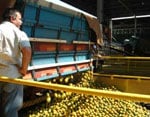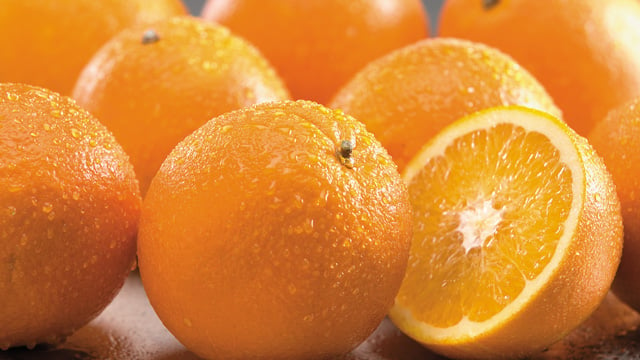Procesado de cítricos
El éxito de la producción de zumo de fruta depende de lograr un equilibrio crítico entre aspecto, sabor y textura por un lado y cuestiones de salud, seguridad y costes de fabricación por el otro. Los equipos, sistemas y servicios de Alfa Laval ayudan a los clientes a lograr este equilibrio en operaciones concretas de las factorías de procesado de cítricos.
Separación, concentración y pasteurización de zumo de naranja
Si produce zumo de naranja, los decantadores centrífugos Foodec son ideales para eliminar la pulpa después de la extracción; las separadoras centrífugas de discos Alfa Laval, de distintos tipos y tamaños, son muy utilizadas en la clarificación y la recuperación de la pulpa para zumos.
Separación hermética
Transformar el limón en zumo produce altos niveles de aceite cítrico en el zumo. La mejor manera de reducir estos niveles de aceite sin poner en riesgo la calidad del zumo es mediante la separación centrífuga. Se trata de una operación extremadamente delicada debido a que las cantidades de aceite son ínfimas.
Los separadóras centrífugas herméticas Alfa Laval son capaces de recuperar este aceite de forma eficaz y fiable, debido a la acción ultrasuave del bowl hermético.
Pasteurización de naranjas
La tecnología de los intercambiadores de calor compactos, térmicamente eficientes de Alfa Laval, también se emplea para lograr el tratamiento más suave posible de los zumos no procedentes de concentrados (aunque ricos en pulpa) al ajustar las temperaturas. Estas unidades Alfa Laval también se utilizan en la pasteurización, que inhibe las enzimas del zumo y lo hace microbiológicamente estable.
Aroma y recuperación de aceites
También el aceite y los aromas de alto valor pueden extraerse de las naranjas junto al procesamiento de zumo. Alfa Laval también puede ofrecerle unidades de recuperación de aceite de última generación que transformen las delicadas emulsiones de aceites en aceite de piel de naranja claro y puro.
 Oranges
Oranges
Oranges are cultivated in tropical and subtropical regions throughout the world. About 60 million tonnes of oranges are grown annually, accounting for more than two thirds of the world production of all citrus fruit. Of this, about 40% are processed into juice and the rest consumed as whole fruit.
Focus on concentrate
There are normally two focal points in the commercial processing of oranges – the juice itself and the oil extracted from the peel.
The juice is normally processed into concentrate or high-quality NFC (Not From Concentrate) juice, which can usually be sold at a premium. NFC-based juice is currently in considerable demand worldwide, and is the fastest-growing market segment for orange juice.
When the juice is produced as concentrate, equipment such as AlfaVap rising-film evaporators ensures rapid, low-temperature concentration. With the addition of a special aroma recovery unit, this gentle treatment helps make sure you get juice of the best quality.
Separation, concentration and pasteurization of oranges.
Alfa Laval is a world leader in applying advanced centrifugal separation technologies to food and beverage processing.
If you produce orange juice, Foodec decanter centrifuges are ideal for removing pulp after extraction, while different types and sizes of Alfa Laval disc stack centrifuges are widely used in clarification.
Compact, thermally efficient Alfa Laval heat exchanger technology is also widely used to ensure the gentlest possible treatment when adjusting temperatures, and also for pasteurization that deactivates any enzymes present in the juice and makes it microbiologically stable.
Aroma and oil recovery
High-value oil and aromas can also be extracted from oranges side by side with juice processing.
Alfa Laval can also supply you with state-of-the-art oil recovery units that can process delicate oil emulsions into clear, pure peel oil.
Lemons
Lemons are mainly grown for the special culinary properties of the highly acid juice and also for the oil extracted from the peel. This fetches a very high price, and is therefore much in focus when processing lemons.
The many kinds of juice that can be extracted from citrus fruit are normally destined either for domestic consumption or for processing into concentrate or high-quality NFC juice. This is not the case for lemon juice, however, because this juice is too acid to drink.
The juice is normally either concentrated to approx. 48–55 °Bx by evaporation or – less commonly – sold as single-strength juice. This juice can also be used as an ingredient in many other beverages, as it is known for its stable qualities.
Versatile revenue maximization
Regardless of whether you run a single-fruit processing operation or a multi-fruit installation, Alfa Laval systems and equipment can help you achieve quality levels that strengthen your revenues from lemon products.
The oils side
In citrus fruit processing, Alfa Laval is also renowned for equipment that separates oil from the peel. During this process, it is important to safeguard quality via the effective thermal management available from market-leader Alfa Laval equipment.
Hermetic separation
Processing lemons into juice often results in high levels of citrus oil in the juice.
The best way to reduce such oil levels without jeopardizing the quality of the juice is by centrifugation. This is an extremely delicate operation, because the amounts of oil are minute. Alfa Laval hermetic separators are able to remove this oil effectively and reliably due to the ultra-smooth action of the hermetic bowl.

